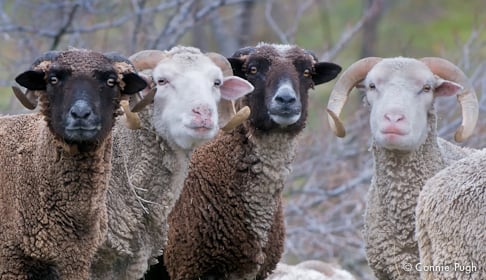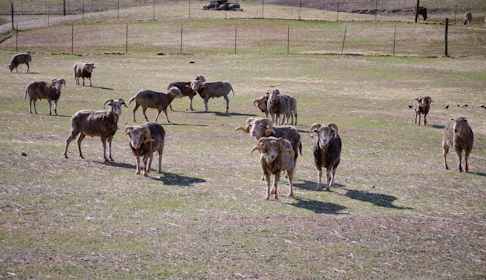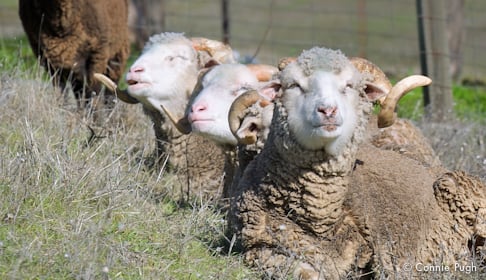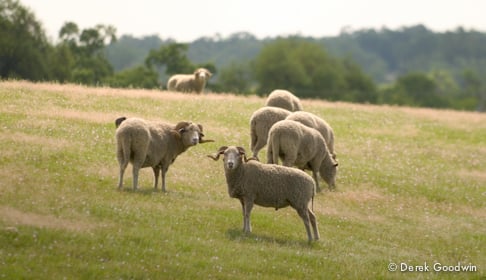By Susie Coston, National Shelter Director
The “Santa Cruz sheep” of our Northern California Shelter belong to a lineage that was once at home on California’s Santa Cruz Island, roaming its hills and valleys 24,000 sheep strong. Today, there are no sheep on the island. Aside from a small population raised by mainland heritage breeders, the flock members at our shelter are probably the last surviving descendents of the island sheep.
Island Dawn
Sheep arrived on Santa Cruz Island in the 1800s, brought by ranchers. As the island’s ranching industry waxed and waned over the ensuing decades, escaped and abandoned sheep formed a feral population, which evolved into a tough, independent new breed.
By the 1980s, sheep ranching had declined substantially on Santa Cruz Island. One remaining ranching family, the Gherinis, retained 10 percent ownership of the island. The other 90 percent had been acquired in 1978 by the Nature Conservancy (TNC). Regarding the feral sheep as an invasive species, the Conservancy began a program of eradication.
Dark Days
TNC’s violent campaign included funding aerial shootings of the sheep and shipping groups to the mainland for slaughter. In 1984, the Gherinis opted to make a profit out of killing the sheep as well. They leased their remaining ranch lands to an “adventure” club, whose members hunted the sheep still living in the area.
In 1997, as they prepared to sell their land on the island, the Gherinis decided to kill off all the remaining sheep there. TNC and the National Park Service (NPS) agreed to help by organizing a hunt. It looked like the end for the Santa Cruz sheep, who had survived on their own, and weathered the lethal harassment of their human neighbors, for at least 70 years.
Refuge on the Mainland
Friends on the mainland, however, were ready to put up a fight. When TNC and NPS announced they were going to kill the sheep, the local humane agency and area citizens joined with Farm Sanctuary to stop the cruel hunt. We offered to take hundreds of the animals and launch a national rescue and adoption effort to place as many sheep as possible into safe, loving homes. After immense public pressure and media attention, the Gherini family agreed to release 200 of the sheep to Farm Sanctuary, and we welcomed this flock to our shelter in Orland, CA.
That was 18 years ago, and they have been good years for these sheep. Most remained stalwartly independent and wary of humans, and we left them to enjoy their pasture largely undisturbed, intervening only when they needed us. During the dry season, when grazing was sparse, we provided hay. When a sheep was sick or injured, we gave them care, and as the flock became older and more vulnerable to predators, we began shepherding them in from the hills at night. Some of the bolder sheep, and the few who arrived as lambs, became friendly with us. For the most part, however, they continued life much as they had on the island, roving our stunning hill pastures everyday. Only, here they were safe from persecution.
Old Age
The hardy Santa Cruz sheep remained strong and healthy for many years. Eventually, however, those years caught up to them. We have now lost most of the flock to old age. As we mourn these departed members of our shelter family, and with them the gradual ending of an era, we are also doing more than ever for the surviving flock mates, who now require geriatric care.
We monitor these venerable sheep closely, with an eye to maintaining their comfort and mobility. Most of them are blind and experience mild to severe arthritis; about a third of the flock receives pain medication. Many have few to no teeth left, and we give these sheep a special mash of soaked feed that’s easy for them to eat. Because the Santa Cruz sheep remain essentially feral, they must be treated differently from our domestic sheep, who are inured to human interaction (and in many cases quite enjoy it). In order to minimize our time spent handling them, and thus minimize their stress, we administer their care very efficiently.
The Santa Cruz sheep live together in a special-needs pasture, where we can easily visit them for care. Despite their infirmities, most still prefer to spend all day outside. When nighttime temperatures drop too low, we bring them into the barn to keep them safe from exposure.
Flock Strong
When the flock has slept in the barn at night, it’s always Karana who leads the charge back out to pasture the next morning. The last of the female sheep rescued from the island, Karana is an important figure in the herd. She has arthritis in her shoulders, for which she receives daily pain medication, but that doesn’t slow her down or prevent her from making sure the guys know who’s in charge. She’s also a comforting influence in the group. In stressful situations, many of the others will flock to her for reassurance.
Another flock leader is Riccardo, the most active of the group. He is one of the few who shows little sign of arthritis. He has his teeth, and his sight remains normal. When it’s time for health checks, he still has plenty of vigor to give caregivers the runaround, dashing and jumping out of their grasp. With his flock mates, meanwhile, he is something of a caregiver himself: The blind sheep will call out if they get separated from the flock, and it is always Riccardo who calls back to help them find their friends again.
Keeping the Light
Today, 15 Santa Cruz sheep remain at the shelter. Sheep are considered old around 12 years of age, but these sheep are all at least 18, making them some of the oldest sheep we have ever heard of. They have spent all their lives in the sunshine and fresh air, with the earth beneath their hooves and the smell of grass in their nostrils, heeding their instincts, finding comfort and strength in their flock. They have lived as they wished, experiencing the full arc of life. And now, as they come to the end of that arc, they have us to keep their final days contented, peaceful, and full of dignity. It is a privilege.




